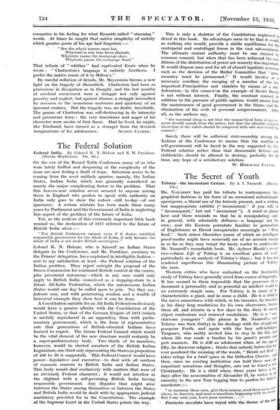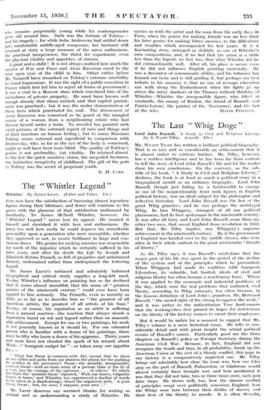The Secret of Youth
MR. NAZAROFF has paid his tribute to contemporary bin• graphical fashions in the form of an occasional melodramatic aposiopesis, a liberal use of the historic present, and a striking but inappropriate subtitle (" inconsistent," if you will, or " inconsequent," but not " inconstant "). A word or phrase here and there reminds us that he is manipulating—and, in general, with admirable deftness—a language not his own ; and the Eastern potentate familiar to generations of Englishmen as Herod masquerades amusingly as " King Irod." Such minor blemishes (some of which an intelligent proof-reader might have removed) are of no account except in so far as they may tempt the hasty rcader to under-value Mr. Nazaroff's remarkable book. Mr. Aylmer Maude's recent two-volume Life of Tolsioy is an excellent piece of wort. particularly as an analysis of Tolstoy's ideas ; but it has not rendered superfluous this illuminating picture of Tolstoy the man.
Western critics who have embarked on the fascinating study of Tolstoy have generally erred from excess of ingenuity. It has seemed to them impossible that the possessor of to dominant a personality and so powerful an intellect could he an extremely simple man. For Tolstoy is in some of hh characteristics a giant, and in some a child. He is a child in the naive earnestness with which, in his twenties, he inscribes in his diary long resolutions for his own observance, besets them all, and returns in a few days to the diary to record abject confessions and renewed resolutions. He is a "mis- chievous youngster " (the phrase is Mr. Nazaroff's, and Tolstoy was then thirty) in his dealings with the stupid and pompous Foeth, and again with the lazy self-indulgent Turgenev, who rashly invited him to stay in his flat, and whose life was made a burden by his guest's pranks and pert manners. He is still an adolescent when, at the age of fifty, he discovers religion ; thinks that nobody before him 165 ever pondered the meaning of the words, " Resist not Evil ". takes refuge for a brief space in the Orthodok Church and then, since no existing institution can hold these new, 311' important sensations and thoughts, sets out to found a nor
Christianity: He is a child when, three years later, a few days after the assassination of Alexander II, he writes in atl sincerity to the new Tsar begging him to pardon his fathers murderers :— '
" to summon these men, gii'e thein money, sand them 8.1,5'1 whore, to America, and issue-a manifesto beginning with the vo.
• But I goy unto you, Love your enemies . • - - • Fantastic novelists have toyed-with the 'theme of the os
who remains perpetually young while his contemporaries grew old around him. Such was the fortune of Tolstoy- and his tragedy ; for while Sofia Andreevna had settled down into comfortable middle-aged composure, her husband still retained at sixty a large measure of the naive enthusiasm, the practical inexperience, the thirst for experiment, even the physical vitality and appetites, of sixteen.
A giant and a child I It is not always realized how much the creator of War and Peace and Anna Karenina owed to the wide open eyes of the child in him. Other critics before Mr. Nazaroff have remarked on Tolstoy's extreme sensibility to visual impressions. It was the sight of a public execution in France which first led him to reject all forms of government ; it was a visit to a Moscow slum which convinced him of the wickedness of private property. He must have known well enough already that slums existed, and that capital punish- ment was practised ; but it was the ocular demonstration of these facts which penetrated his soul. The denouement of Anna Karenina was conceived as he gazed at the mangled corpse of a woman from a neighbouring estate who had thrown herself under a train. No novelist has painted such vivid pictures of the outward aspect of men and things and of their reactions on human feeling ; but to many Russians Tolstoy seems external and superficial in comparison with Dostoevsky, who, so far as the eye of the body is concerned, might as well have been born blind. The quality of Tolstoy's genius is not profundity, but vitality. He retained almost to the last the quick sensitive vision, the unspoiled freshness, the instinctive receptivity of childhood. The gift of the gods to Tolstoy was the secret of perpetual youth.
E. H. CARR.









































 Previous page
Previous page